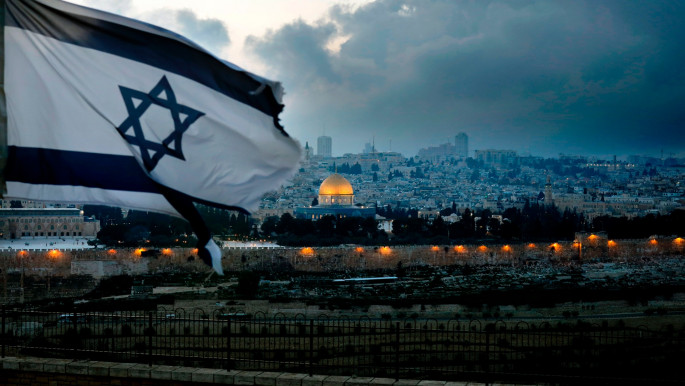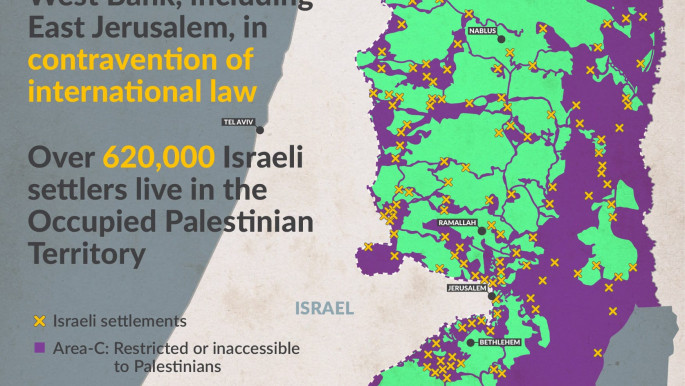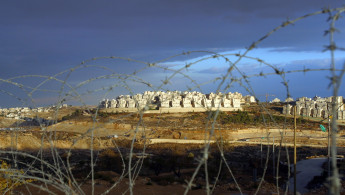Will the Palestinian Authority really cut ties with Israel?
"The Palestine Liberation Organization and the State of Palestine are absolved, as of today, of all the agreements and understandings with the American and Israeli governments and of all the obligations based on these understandings and agreements, including the security ones," he announced following an emergency meeting of Palestinian leaders.
Dramatic though it may seem, Abbas' threat also sounds rather familiar for those who have been following the conflict's most recent chapter, and despite the regularity of such pledges, his feeble government has not yet followed them up with anything more than rhetoric.
But the 85-year-old leader has seemingly swung into action for now, informing the UN Secretary General of his plans while the prime minister, Mohammed Shtayyeh, has ordered his cabinet to immediately begin working on implementing the president's decision.
But in reality, what would Palestinian society look like absolved of all agreements with Israel, the authority that governs all its borders, employs tens of thousands of its citizens and is its main trading partner
Moreover, the deep-running security coordination between the Israeli government and the PA is overwhelmingly judged by analysts to benefit both sides, so would he really end it?
 |
The PA uses security coordination to crack down on political opposition within the West Bank, from Hamas or otherwise -Tareq Baconi |
 |
Tareq Baconi, Israel-Palestine analyst at the International Crisis Group, told The New Arab that the most recent announcements "are likely empty threats". Here we shall look into the reasons why.
Palestinian movement frozen?
Israel controls all but one of the Palestinian territories' entry and exit points. Therefore a rupture in ties would mean Palestinians travelling in and out of Palestine - whether into Israel or abroad, both which require permits from the Israeli government - would likely be stuck.
Even inside the West Bank itself, where the military occupation controls a tight network of checkpoints it opens and closes at its will, Palestinians would be confined to small, separated enclaves of Areas A and B in the West Bank - the roughly 40 percent of territory where the Palestinian Authority has civil control - and a pocket of East Jerusalem.
 |
|
| Read more: The day after annexation: Israel, Palestine and the one-state reality |
The implications of this would be vast: not only do thousands of Palestinian students move between universities inside Israel, East Jerusalem and the West Bank, long-running healthcare coordination means thousands of Palestinians receive specialist treatment, for cancer and kidney dialysis in particular, in Israeli or East Jerusalem hospitals, not to mention the tens and thousands of West Bank Palestinians who cross into Israel for work.
Job losses for thousands of Palestinians?
Some 85,000 Palestinians possess Israeli work permits, the overwhelming majority of whom are from the West Bank. Meanwhile tens of thousands more have permits to work in Israeli settlements, or enter Israel illegally for work, according to Palestinian estimates.
Not only does this supply a flow of cheap labour to the Israeli economy, it also provides many West Bank families with vital income. Unemployment in the territory has stagnated around 17 percent for several years, but the end of 2019 saw a fall to 14 percent due to an increase in Palestinians working in Israel, according to the World Bank.
 |
Security coordination enables Fatah to ensure its own political survival as the Palestinian leadership, at the cost of aiding the continuity of the occupation |  |
With no alternative employment initiatives touted by the Palestinian Authority to make up for this potential loss, a dramatic severing of ties would spark backlash from both Israeli businesses and out-of-pocket Palestinian families, while a sudden rise in unemployment is firmly against the PA's interest.
An end to all imports and exports?
Tearing up agreements with Israel would also mean that all Palestinian imports and exports would cease. Moreover, Israel accounts for 82.5 percent of Palestinian imports and 55 percent of its exports, according the ITA.
When the PA has made minor attempts to diversify its trading partners, Israel has swiftly stamped these out. For example, in September last year the PA attempted to stop importing beef from Israel, but Israeli producers complained, prompting the Israeli government to enforce a de facto economic siege on the West Bank, blocking all Palestinian agricultural exports.
 |
|
| Click to enlarge |
What is more, the PA has made no real policy to encourage localised or self-sufficient economies in the West Bank, which as analysts have pointed out, would harden it to Israeli reprisals.
Security coordination: More than suppressing Hamas
Following its establishment out of the Oslo Accord, the PA entered into far-reaching security coordination agreements with Israel, based on an agreement that Israel would withdraw from land designated for a future Palestinian state on the condition that the PA could ensure the security of Israeli civilians and reduce violence in the territories.
However now consuming a third of the PA's public expenditure - more than education and health combined - and having distanced Palestinians ever further from ending to the occupation, security coordination has become a major grievance for West Bank residents.
Palestinians and analysts alike see coordination as beneficial to both sides: Israel is helped in crushing any resistance to the occupation in general, which includes Hamas, the main rival of the Fatah-run PA.
Baconi pointed out that in reality, suppressing Hamas "is far from [the PA's] sole goal."
"The PA uses security coordination to crack down on political opposition within the West Bank, from Hamas or otherwise," he said. In this way, security coordination enables Fatah to ensure its own political survival as the Palestinian leadership, at the cost of aiding the continuity of the occupation.
"Security coordination is no longer simply about preventing Hamas's institutional presence in the West Bank - itself a problematic goal given that Hamas was democratically elected to lead in 2006 - but is rather about sustaining the occupation at little cost to the Israelis by ensuring the pacification of the Palestinian population under its rule," Baconi added.
 |
Israel will readily meet the PA's waywardness with an outsized reaction, choking Palestinian society until it falls back in line |  |
Moreover, a Palestinian security official told Haaretz that although Abbas does intend to somewhat lower the level of security coordination with Israeli authorities, he has not yet "closed the door", adding that entirely stopping coordination might not even be possible.
As has been demonstrated throughout the conflict, Israel will readily meet the PA's waywardness with an outsized reaction, choking Palestinian society until it falls back in line. In reality, the PA does not position itself to actually resist occupation, and in its current state under its ailing and stagnating leadership, is not designed to function outside of occupation.
Although Israel's planned annexation of its settlements and the Jordan Valley is the most insurmountable in a long series of obstacles to the two-state solution, there are few ways in which the PA can muster such a response without causing unimaginable disruption and stress to Palestinians living in the West Bank, their livelihoods, and the survival of the PA itself.
Florence Dixon is a journalist at The New Arab.
Follow her on Twitter: @flo_dix





 Follow the Middle East's top stories in English at The New Arab on Google News
Follow the Middle East's top stories in English at The New Arab on Google News


